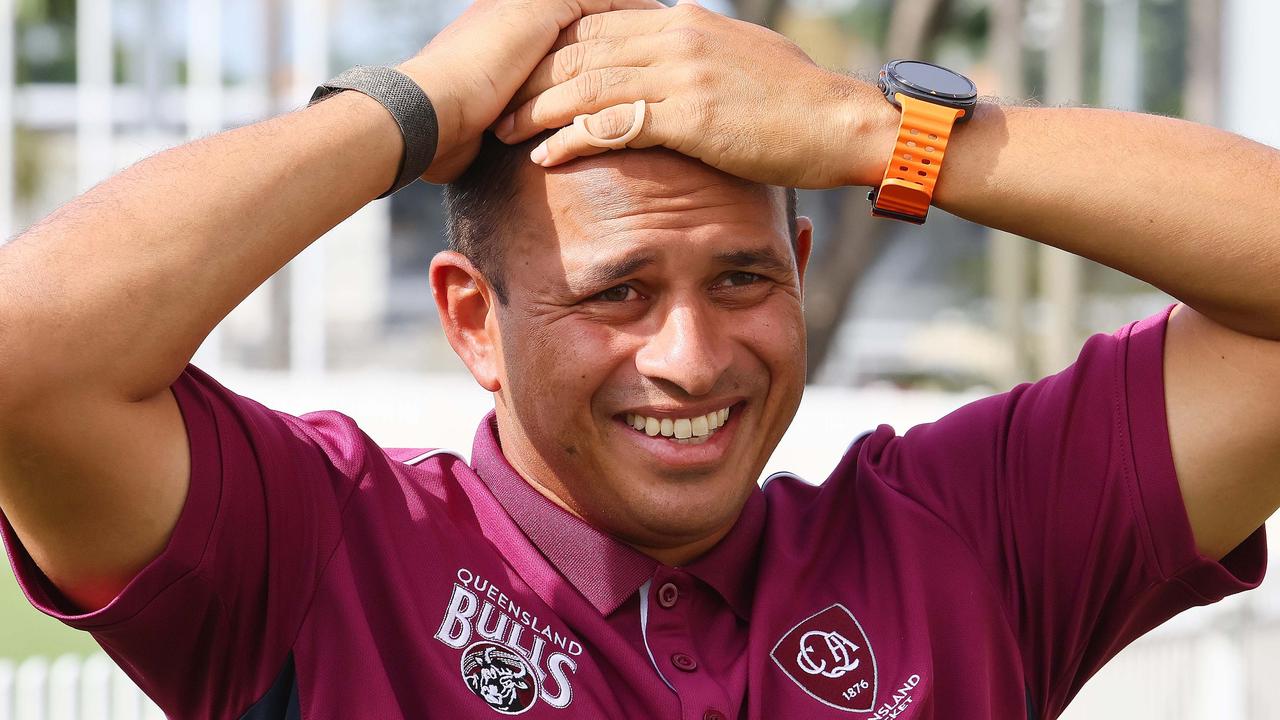Tony Dell, the Test fast bowler who went from Vietnam killing fields to war with the English in Ashes
TONY Dell was 23 when he and Dennis Lillee opened fire against England at the SCG. He was 21 when he opened fire on the Viet Cong.
TONY Dell was 23 when he and Dennis Lillee opened fire against England at the SCG. He was 21 when he opened fire on the Viet Cong.
At the Gabba he saw Jeff Thomson bowl like a bullet. In Vietnam he saw a bullet blow an enemy soldier's brains out. He saw another enemy soldier shot in the chest and his whole back explode with the exit wound.
On the SCG in 1971 Dell watched the English captain Ray Illingworth walk his team off the field because of crowd violence but once, in 1968, 200 heavily armed Viet Cong, their eyes roving about looking for Australians to kill, walked past the big Queenslander and a handful of his Aussie comrades as they hid in deathly silence in jungle undergrowth.
"Unless you have been in that situation you have no idea what real fear is like,'' Dell tells me, 45 years and a million nightmares later.
"I was absolutely shitting myself. You knew if you coughed you were dead and so were all your mates.''
The only Test cricketer to fight in Vietnam, Dell, now 66, says he has not had a decent night's sleep in 35 years. He once took 12 wickets in a match for Queensland against New Zealand but since the late 70s he counts two hours sleep at a time as his personal best.
"I saw things in Vietnam that the human brain is not meant to experience,'' he says and the old fast bowler's hulking 198cm frame stiffens at the flashback.
"You get post-traumatic stress when the brain is exposed to a violent or catastrophic event. These experiences are buried in the subconscious but they bubble and ferment. Then they come back to haunt you.''
PTS made the brooding giant impossible to live with. His dark moods cost him his job at a Brisbane advertising agency where he had worked for 15 years and in the bedroom memories of Vietnam killed his sex drive and made him forget the art of intimacy.
He says the horrors of war wrecked his marriage. His wife and three kids suffered from the knock-on effect of what happened amid the mud, blood and tears of paddy fields and scorched earth.
The former Australian fast bowler was diagnosed with PTS in 2008, 40 years after coming home after the Tet Offensive but says he would have been suffering in ignorance the whole time. Now on a pension, he spends most of his time running Stand Tall, an organisation designed to bring awareness to what he describes as a "humungous problem''.
"As many as 1.5 million Australians could be suffering PTS,'' he says, "not just returned soldiers but ambulance officers, policemen, firefighters. They all see horrific things and then have to back up and do it all again.
"Soon we'll be pulling out of Afghanistan and we've got tens of thousands of diggers who have to be assimilated back into society after going through hell.
"If you consider that someone with post traumatic stress can affect seven family members and friends then half of our population suffers the consequences as well.''
After Vietnam, Dell was demobbed, some of his comrades deranged.
The memories of the war have stalked him.
In the aftermath, he was beset by foul moods and anti-social behaviour. With some irony, he says it might have made him a better fast bowler. Certainly it made him more volatile, raging at umpiring decisions and misfielding.
"I spent 12 months in Vietnam going through enemy camps and destroying them, wading through paddy fields, getting shot at. I was just an ordinary soldier, nothing special. We all went through the same things. A week later I was back at work, walking down Queen St with no counselling or anything.''
Dell tried to get on with life. He opened the bowling for Eastern Suburbs, made the Queensland side in 1970 alongside Phil Carlson, Sam Trimble, John Maclean and Ross Duncan and in 1971 he was called up to play against Illingworth's England side in the Ashes decider at the SCG.
Dennis Lillee took three wickets in the match and Dell five.
England fast bowler John Snow felled Australia's Terry Jenner with a bouncer and was then attacked by a drunken spectator. Illingworth took his team off the field but, faced with the prospect of forfeiting the Ashes, the Poms returned to win the series 2-0.
Dell's stress-related illness forced him to quit the Queensland side in 1975 after a season playing alongside Jeff Thomson and Greg Chappell.
He is not sure how this Ashes series will pan out but fears the Poms have worked out the deficiencies in Michael Clarke's defence and that after a quiet series in England, Alastair Cook and Jonathan Trott will be looking to make amends in Australia.
PTS damages the memory and Dell struggles to remember a lot about his career, even his Test debut.
He wishes he could forget the horrors of war.
The logo for Stand Tall is an orange lightning bolt. It could symbolise the havoc he wreaked as a left-arm fast bowler, whose career was all too brief.
Instead, he says, it symbolises the instant that people are changed by the shocking anguish of a traumatic event.
"Most Australians who have the condition have contracted it serving their country in the armed forces or helping their fellow Australians in tragedies,'' he says.
"If left untreated it develops into deep depression and people's lives crumble.
"The government gives minimal support for something that is a massive problem and it's growing. We have to make people aware that it's time to do something.''


